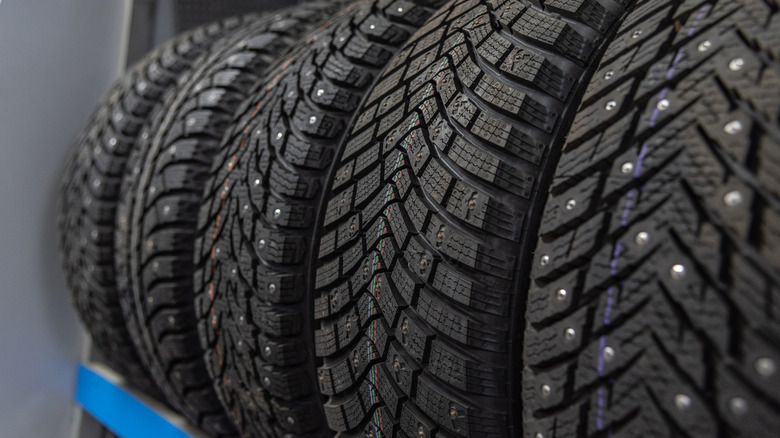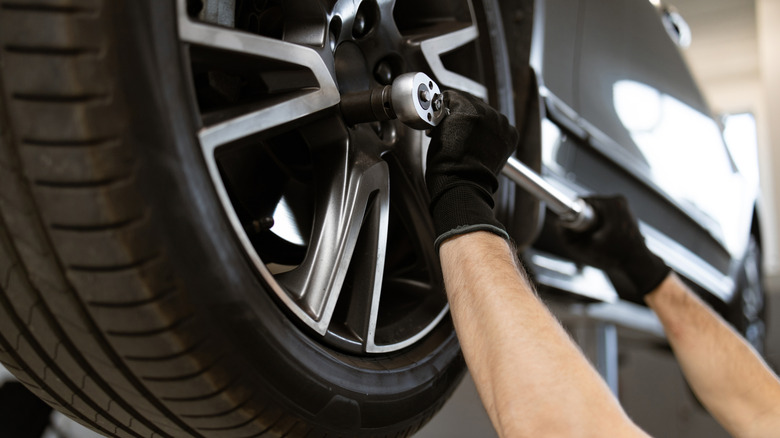These Tire Brands Make The Quietest Tires (According To Reviews)
All tires generate noise as they roll along the road. This constant hum contributes to noise pollution and can trigger anxiety or stress reactions in people with low tolerances for auditory disruptions. Road noise is a constant for residents of areas around highways and thoroughfares, as well as a source of fatigue for anyone riding in a car. If the drone or screech of tire noise irks you and you want a peaceful ride, then this should be a priority when you shop for tires. Today's new tire market offers a wide selection of tires specifically engineered to produce minimal road noise.
Our rankings of major tire brands of 2025 were based on multiple criteria, but several of these companies offer tires with low road noise. Japanese-made Toyo Tires and two of the three American-made tire brands sell quiet-type rubber tires. Many satisfied buyers testify in online reviews that some of these tires are almost silent on the road. Tire Rack dubbed Bridgestone's Dueler LX, Firestone's Destination LE3, and the Goodyear Wrangler Steadfast HT among the quietest tires available after testing several highway all-season tires from different brands. More than 600 Tire Rack customers ranked the Destination LE3 9.0 out of 10 for comfort, a category that includes road noise.
Tire Agent also compiled two lists of passenger tires and truck and SUV tires that produce low noise. Tire models that landed on those lists include Michelin's Primary Tour A/S, Hankook's Dynapro AT2 (RF11), and the Toyo Extensa A/S II. Meanwhile, after conducting an in-depth review, Tireer.com named its picks for the best quiet tires of 2025. The top three were the Michelin CrossClimate 2, Continental PureContact LS, and Bridgestone Turanza QuietTrack. Goodyear, Michelin, Cooper, and Bridgestone produce tires that consistently score high with reviewers for comfort and road noise.
Why are some tires are louder than others?
Most tires are engineered with maximum traction in mind. The design of tread patterns, the rubber compounds used, and methods of construction are mainly focused on giving the tires as secure a grip as possible on the intended surface. This is why all-terrain tires used in off-roading feature deep, complex, and aggressive treads for better traction on dirt, sand, and gravel. Interestingly, a tire's tread is also one of the biggest factors in the noise it makes when driven on the road. Deeper, wider, and more aggressive tread patterns typical of all-terrain or mud-terrain tires ensure the vehicle will have a strong grip on challenging paths, but they also make these tires rather noisy on the road.
When driven on flat surfaces, the grooves of a tire trap and compress air while turning. Sound is then produced as this compressed air escapes the boundaries of the tire. Depending on the size of the vehicle and its speed, the cycle produces humming, droning, or whining noises. To minimize the noise, manufacturers make tires with shallower and more closely spaced tread blocks. This way, less air is trapped and compressed when the tires roll along a smooth road, and the interaction between the tire and road surface produces less vibration and noise. Some brands also choose to vary tread block sizes and shapes to vary the pitch of the noise generated by tires in different positions on the car, resulting in a more neutral and harmonious sound that more easily blends into the background noise of traffic. These factors help explain why touring and highway tires with smaller grooves between tread blocks are usually deemed the quietest.

